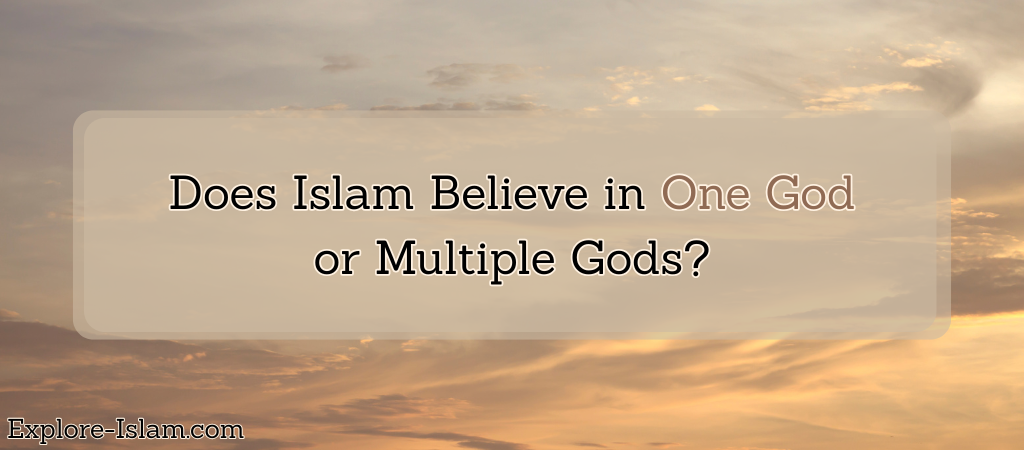Wondering whether Islam believes in one God or multiple gods? The answer lies at the very heart of Islamic belief: pure monotheism. Islam strongly emphasizes Tawheed—the oneness of God—as its most fundamental doctrine.
The Quran repeatedly affirms that there is no deity worthy of worship except Him. Unlike beliefs that divide divine power among many gods, Islam teaches that the universe’s order, harmony, and design point clearly to a single, all-powerful Creator. Keep reading to discover how Islam defines true divinity and why polytheism is considered a logical contradiction.
Does Islam Believe in One God or Multiple Gods?
Yes, Islam unequivocally believes in One unipersonal God. This belief forms the foundation of the Islamic faith and is known as Tawheed, emphasizing the pure monotheism of Allah.
By tracing the Quran and Propeht Muhammad (PBUH) traditions, one find Islam clearly support this core belief of monotheism in different aspects:
- The core of the Islamic creed, the Shahadah, affirms: “أشهد أن لا إله إلا الله” (I bear witness that there is no god but Allah). This declaration is the gateway to Islam and confirms the oneness of Allah.
- The Quran plainly declares that there is only one God—not a “God Family,” but one true, indivisible God. The Quran repeatedly stresses Allah’s Oneness in many verses. For example:
“And your god is One God. There is no deity [worthy of worship] except Him.” (Quran 2:163). - Islam teaches that there is only one true God for all people, who governs their affairs.
- Islam corrects the misconceptions about the perception of God distorted by time after the passing of previous Propehts calling for the same message of monotheism.
- The proper name of this one Almighty God is Allah. This name is not exclusive to Muslims; it is the Arabic word for the only true One God used even before Islam.
- Islam rejects polytheism (belief in multiple gods). The idea of multiple deities contradicts reason and the harmony of the universe. True divinity must be unique and supreme, not divided or rivaled.
In conclusion, the belief in one and only one God (Allah) is a fundamental and unwavering principle in Islam, fully supported by the Quran and the core tenets of Islamic faith.
Read more:
Why Does Islam Believe in One God?
Islam believes in one God because this concept is the core of the Islamic faith—Tawheed—and is clearly proclaimed in its holy book, the Quran. The following are key reasons supporting this fundamental belief:
1. Monotheism is the Message of All Prophets
Islam calls for belief in One God such as all previous Prophets and divine books before being altered by humans. Almighty God stresses this fact in the Quran (translated meanings):
“We never sent a messenger before you ˹O Prophet˺ without revealing to him: “There is no god ˹worthy of worship˺ except Me, so worship Me ˹alone˺.”
Read more:
- Similarities & differences between Islam and Christianity
- Judaism, Christianity And Islam Similarities And Differences
2. Logical Necessity of Oneness:
If there were more than one God, it would logically negate the divinity of all, as true divinity demands uniqueness and superiority. Multiple gods would contradict the very definition of God as the most supreme being. If one God were superior to others, it would inherently support monotheism and deny the divinity of the rest.
3. Harmony and Order in the Universe:
The precise harmony and order in the universe—from atomic structure to galactic systems—indicate one Supreme and Capable Creator. If there were multiple competing gods, their conflicting wills would likely cause chaos, not the observed synchronization. The absence of disorder or mythical anomalies supports the idea of a single, all-powerful God.
4. Attributes of the True God Necessitate Monotheism:
Islam defines the true God as One, Unique, and Supreme, possessing the best attributes. Polytheism contradicts these traits by suggesting divided power and conflicting wills. The one true God has absolute will, power, and knowledge, and it’s considered illogical for any creature to assign or limit divine power.
5. Islam Rejects Partners and Offspring:
God in Islam is One—with no wife, son, or equal. The Quran strongly rejects the idea of God having offspring. Allah asks: “How could He have a son when He does not have a companion?” Attributing a son to the All-Merciful is described in the Quran as a grave offense.
6. Direct Relationship with God Is Unique in Islam:
Islam teaches that there are no mediators between Allah and His servants. Allah is All-Forgiving, All-Hearing, and All-Responsive to those who call upon Him directly. This accessibility makes the need for multiple gods or intercessors irrelevant.
In essence, belief in one God (Allah) is not only a pillar of Islam but a logical conclusion based on the nature of divinity, the structure of the universe, and the clear message of the Quran.
Read also:
Conclusion
In conclusion, Islam holds an unwavering belief in one God—Allah, the sole Creator, Sustainer, and Ruler of all existence. The Quran, reason, and the observable order of the universe all support this monotheistic view.
Islam firmly rejects the idea of multiple gods, partners, or divine offspring, arguing that true divinity must be unique and indivisible. The Islamic concept of God is not exclusive to Muslims; it calls all humanity to recognize and worship the One Almighty God without intermediaries.
This clear and powerful vision of oneness sets Islam apart and forms the core of its faith and purpose.
Curious to know more about God in Islam?
Start a conversation with our team rigt now and subscribe to explore Islam newsletter for more related topics!

